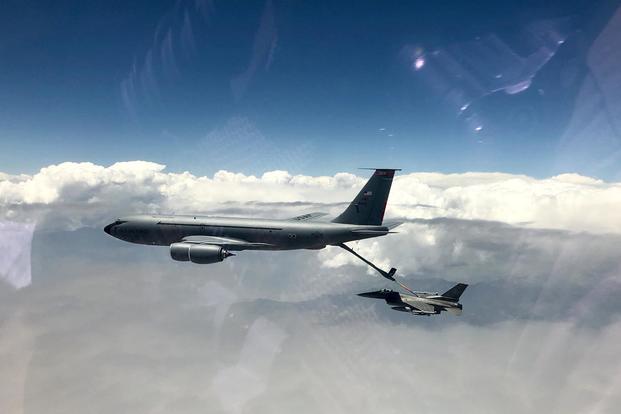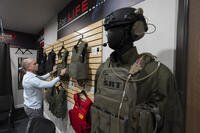Air National Guard KC-135 Stratotanker tanker crews from eight states have enabled a significant boost in airstrikes against the Taliban and other enemy groups in Afghanistan since relocating to Kandahar, according to Air Forces Central Command.
Being based at Kandahar means, "When we take off, we can get to our positions within 25 minutes instead of two-and-a-half hours, ready to offload gas," said Master Sgt. Mat Ellison, a boom operator for the 340th Expeditionary Air Refueling Squadron (EARS).
"We can get to the fight faster, we enable our warfighters to stay in their mission longer and, on top of that, we are burning less gas with each sortie," Ellison said in a release put out last week by the 455th Air Expeditionary Wing.
The KC-135s from Air National Guard units in New Hampshire, Iowa, Kansas, Wisconsin, Tennessee, Illinois, Maine and Nebraska began moving from Al Udeid Air Base in Qatar to Kandahar in September 2017 as part of the buildup of airpower ordered by President Donald Trump under a new strategy for Afghanistan announced in August 2017.
A-10C Thunderbolt attack aircraft, HH-60G Pave Hawk helicopters and MQ-9 Reaper drones also transferred to Kandahar at about the same time to support the U.S. Freedom's Sentinel and NATO Resolute Support missions.
In announcing the tanker moves in September 2017, Air Force Lt. Gen. Jeffrey Harrigian, AFCENT commander, said the KC-135s were "burning a lot of gas getting over to Afghanistan" from Al Udeid and needed to get "closer to the fight."
From September 2017 through September of this year, the Air National Guard tankers have flown 3,316 sorties, offloading 127 million pounds of fuel during 13,537 air refuelings, according to AFCENT.
From January through September of this year, U.S. aircraft conducted a total of 5,213 airstrikes in Afghanistan, compared to 4,361 in all of 2017, the command said.
"This forward-deployment here has allowed us to be intraconnected in the missions of our fighter units," said Lt. Col. Randy Douglas, a 340th Expeditionary Air Refueling Squadron aircraft commander. "Having tankers allows our fighter aircraft to have a persistent presence overhead."
-- Richard Sisk can be reached at Richard.Sisk@Military.com.










